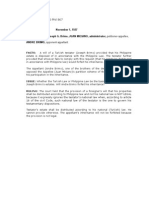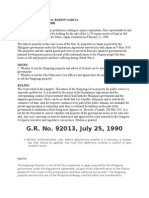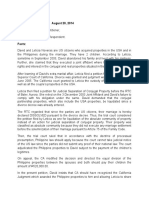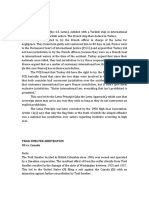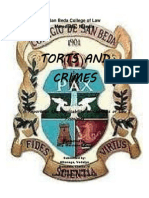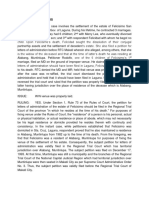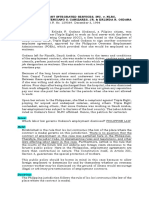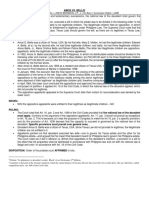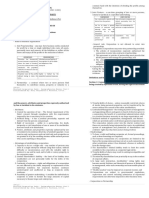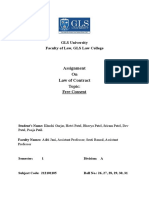Aznar v. Garcia Digest
Aznar v. Garcia Digest
Uploaded by
Kim B.Copyright:
Available Formats
Aznar v. Garcia Digest
Aznar v. Garcia Digest
Uploaded by
Kim B.Copyright
Available Formats
Share this document
Did you find this document useful?
Is this content inappropriate?
Copyright:
Available Formats
Aznar v. Garcia Digest
Aznar v. Garcia Digest
Uploaded by
Kim B.Copyright:
Available Formats
G.R. No.
L-16749, January 31, 1963
IN THE MATTER OF TESTATE ESTATE OF EDWARD E. CHRISTENSEN, DECEASED. ADOLFO C.
AZNAR, Executor and LUCY CHRISTENSEN, Heir of the deceased, Executor and Heir-appellees, vs.
HELEN CHRISTENSEN GARCIA, oppositor-appellant
Counsel: M.R. Sotelo for executor and heir-appellees
Leopoldo M. Abellera and Jovito Salonga for oppositor-appellant
Ponente: Justice Labrador
DOCTRINE:
US CITIZENSHIP NOT DEEMED LOST BY STAY IN THE PHILIPPINES BEFORE INDEPENDENCE.
While the deceased lived and stayed in the Philippines for a considerably long period of time, his US
citizenship was not deemed lost, the Philippines being then occupied by the US until 1946.
RESIDENCE V. DOMICILE. Residence merely requires bodily presence in a place, while domicile requires
bodily presence in that place, as well as the intention to make it one’s domicile.
NCC, ARTICLE 16. Intestate and testamentary succession, with respect to the order of succession, the
amounts of successional rights, and the intrinsic validity, shall be governed by the national law of the person
whose succession is under consideration, regardless of the nature of the property, or where said property
can be found. “National law” in the case at bar cannot refer to general American laws on succession, as no
such law exists. It, therefore, refers to the internal succession law of the State of California for its citizens
domiciled in another jurisdiction, as well as its conflict of law rule.
RENVOI DOCTRINE. Where there matter concerns international law, the forum, in the case at bar, t the
Philippines, must take into account the whole law of the other jurisdiction, including its conflict of law rule,
and shall apply the law as prescribed by the other jurisdiction. In this case, Article 946 of the California Civil
Code provides the personal property follows the person of its owner, and is governed by the law of his
domicile. Applying the renvoi doctrine to avoid inaction through referring the case back and forth from one
jurisdiction’s laws to the other, the Philippine court must apply our laws on this matter, as the conflict of law
rule of California directs.
FACTS:
Edward E. Christensen was born and New York, and went to the Philippines as a teacher on 1901. He went
back to the United States in 1904, and resided in the State of California until 1913. He went back and forth
between the Philippines and the United States, staying notably longer in the former, i.e. staying in the
Philippines for 15 years, leaving for the US, and coming back the following year.
He executed his last will in the Philippines on March 5, 1951, bequeathing to Maria Helen an amount of
PhP 3,600.00 which she was to receive in installments of PhP 100.00 every month, until the sum and all
the interest that shall accrue to it has been exhausted. The rest of his properties, real and personal,
wherever they may be situated, was bequeathed to Maria Lucy. Maria Helen and Maria Lucy are his
acknowledged natural children. He died in Manila on April 30, 1953.
In the disposition of the will of the deceased, Maria Helen opposed the partition as provided in the last will,
asserting that being an acknowledged natural child of the deceased, as previously decided by the courts in
a judicial proceeding, she is entitled to one-half of the estate in full ownership. Maria Helen also stressed
that the estate of the deceased shall be governed by Philippine laws, the deceased being domiciled in the
Philippines. Notwithstanding, should the estate be disposed under the laws of the State of California, Maria
Helen claimed, it is provided under such laws that the property of a resident shall follow the person of the
owner, and shall be governed by the laws of the country of domicile.
AZNAR V. GARCIA | Ruiz
DECISION OF COURT OF FIRST INSTANCE:
Edward was a citizen of California at the time of his death. Thus, his estate shall be governed by the law of
California. Under such law, there is no concept of legitime, and the deceased has the right to dispose his
property in whatever way he desires. Maria Helen filed various motions for reconsideration, all of which
were denied.
ISSUES:
1. W/N Edward’s estate shall be governed by the law of California – NO.
a. W/N he is a citizen of the United States – Yes.
b. W/N he is domiciled in the United States – No.
c. W/N the laws of the disposition of property of California applies to the deceased’s estate –
No, with reference to its conflict of law rule under Article 946 of the California Civil Code
d. W/N the Philippine courts is to use Philippine laws on the matter under the renvoi doctrine
– Yes.
RULING:
Edward’s status as a citizen of the State of California was not lost by his considerably long periods of stay
in the Philippines before its independence from the United States in 1946. However, he is no longer
considered domiciled in California, his intention to make the Philippines his domicile exhibited in his
obviously length of time he stayed in the Philippines from 1901 to his death in 1953.
Under Article 16, the estate of the deceased, with regard to the order of succession, the amount of
successional rights, and the intrinsic validity of the testamentary provisions, shall be governed by his
national law. The deceased being a US citizen, the term “national law” cannot refer to a general United
States law on succession, as no such law exists. This, then, shall be construed to be the testamentary
provisions adopted by the State of California for its citizen domiciled in other jurisdictions.
While the law of California provides for the right to absolute dominion of the testator on the testamentary
disposal of property, there exists a conflict of law rule in the California Civil Code under Article 946. It
provides that unless a contrary law exists in the place where the property is situated, it shall follow the
person of the owner and is governed by the law of his domicile.
This provision refers the matter back to the law of the forum, the Philippines. Under the renvoi doctrine, the
forum shall not refer the matter again to the California law, under Article 16. Instead, the Philippine court is
now constrained to use our law to resolve the matter of succession. The argument that Article 16 shall be
considered as “a contrary law…in the place where the property is situated” under Artilce 946 is without
merit, as it will leave the issue incapable of determination.
Thus, pursuant to the conflict of law rule under Article 946 of the California Civil Code, the law on
succession of the place of domicile of the deceased, the Philippines, shall apply to his estate. The
appellant, as an acknowledged natural child, shall not be deprived of her successional rights under the
Philippine laws.
DISPOSITION:
The decision appealed is reversed. The case is returned to the lower court for the partition to be made as
the Philippine law on succession provides. Costs against appellees.
AZNAR V. GARCIA | Ruiz
You might also like
- Civil Code, Vol. V-Paras PDFDocument100 pagesCivil Code, Vol. V-Paras PDFMarivic Escueta75% (4)
- Sales Sample Exam QuestionsDocument5 pagesSales Sample Exam QuestionsRegina Zagala100% (1)
- Aznar vs. Garcia G.R. No. L-16749 - Case DigestDocument2 pagesAznar vs. Garcia G.R. No. L-16749 - Case DigestGendale Am-is100% (3)
- Velarde Et Al. v. Court of AppealsDocument3 pagesVelarde Et Al. v. Court of AppealsKim B.100% (1)
- Compilation - MCQ - Commercial Law ReviewDocument40 pagesCompilation - MCQ - Commercial Law Reviewbar201175% (4)
- Assignment of CreditDocument6 pagesAssignment of CreditBernie Caswang Mendoza100% (6)
- Aznar vs. GarciaDocument3 pagesAznar vs. GarciaAngel LaguitanNo ratings yet
- Testate Estate of Edward E. Christensen vs. Helen Christensen Garcia, G.R. No. L-16749 January 31, 1963Document1 pageTestate Estate of Edward E. Christensen vs. Helen Christensen Garcia, G.R. No. L-16749 January 31, 1963jmz_13No ratings yet
- Aznar vs. GarciaDocument1 pageAznar vs. GarciaPinky SalvadorNo ratings yet
- Matthews vs. TaylorDocument2 pagesMatthews vs. TaylorKurt Paul Gacoscos Bagayao100% (1)
- Bagong Filipinas Overseas Corporation v. NLRCDocument1 pageBagong Filipinas Overseas Corporation v. NLRCbenjo2001No ratings yet
- Nevsun Resources, Ltd. v. Araya 2020 SCC 5Document2 pagesNevsun Resources, Ltd. v. Araya 2020 SCC 5Franchesca Revello100% (1)
- 25 Republic Vs AbrilleDocument1 page25 Republic Vs AbrilleAngelyn SusonNo ratings yet
- 11 23 2000 G. R. No. 124371 LLORENTE Vs LLORENTEDocument1 page11 23 2000 G. R. No. 124371 LLORENTE Vs LLORENTEConan Grace AgasNo ratings yet
- Del Socorro Vs Van WilsemDocument3 pagesDel Socorro Vs Van WilsemRaven TailNo ratings yet
- Gibbs Vs Govt Digest and FulltextDocument5 pagesGibbs Vs Govt Digest and FulltextMJ DecolongonNo ratings yet
- SoJ v. LantionDocument1 pageSoJ v. LantionCristelle Elaine ColleraNo ratings yet
- Miciano vs. Brimo 50 Phil 867Document1 pageMiciano vs. Brimo 50 Phil 867Ross Camille Salazar100% (2)
- Laurel vs. GarciaDocument9 pagesLaurel vs. Garciachibi_carolNo ratings yet
- Corpuz Vs Sto TomasDocument1 pageCorpuz Vs Sto Tomasgypsy_cutieeeNo ratings yet
- Gasheem Shookat Baksh, Petitioner, vs. Hon. Court of Appeals and Marilou T. Gonzales, RespondentsDocument2 pagesGasheem Shookat Baksh, Petitioner, vs. Hon. Court of Appeals and Marilou T. Gonzales, Respondentsjobelle barcellano100% (1)
- Raytheon International Vs Rouzie GR 162894Document2 pagesRaytheon International Vs Rouzie GR 162894BingoheartNo ratings yet
- WILDVALLEY SHIPPING CO V CaDocument2 pagesWILDVALLEY SHIPPING CO V CaChari100% (1)
- Conflict of Laws Cases - Saudi Arabian Airlines Vs CA EtcDocument2 pagesConflict of Laws Cases - Saudi Arabian Airlines Vs CA Etcseanjharod80% (5)
- Bayot vs. CA 570 SCRA 472Document2 pagesBayot vs. CA 570 SCRA 472Patricia Denise Emilio-Del PilarNo ratings yet
- Wild Valley Vs CADocument3 pagesWild Valley Vs CAWella JaneNo ratings yet
- Fleumer v. Hix, 54 Phil 610, March 17, 1930Document1 pageFleumer v. Hix, 54 Phil 610, March 17, 1930Kathrine Marie AbquinaNo ratings yet
- Noveras Digested For TeamDocument3 pagesNoveras Digested For TeamAnalou Agustin Villeza100% (2)
- Tenchaves V EscanoDocument1 pageTenchaves V EscanoDrexel Arginald AltavanoNo ratings yet
- Aznar VsDocument151 pagesAznar VsnellafayericoNo ratings yet
- Asivest Merchant Bnkers Vs CA, July 20, 2001Document2 pagesAsivest Merchant Bnkers Vs CA, July 20, 2001MasbatePpo PidmuNo ratings yet
- Llorente v. CADocument1 pageLlorente v. CAInes Hamoy JunioNo ratings yet
- Gamboa v. Teves DigestDocument3 pagesGamboa v. Teves DigestLaurice Claire C. Peñamante100% (3)
- Republic of The Philippines Vs ManaloDocument2 pagesRepublic of The Philippines Vs ManaloDerick Torres100% (3)
- Phil Trust Co v. BohananDocument2 pagesPhil Trust Co v. BohanandiegavillanuevaNo ratings yet
- Quita Vs CA and DandanDocument6 pagesQuita Vs CA and DandanQuennieNo ratings yet
- BA Finance Corp Vs CADocument2 pagesBA Finance Corp Vs CAChristianneDominiqueGravosoNo ratings yet
- PIL Chap 9-11Document17 pagesPIL Chap 9-11MirellaNo ratings yet
- Bellis vs. BellisDocument2 pagesBellis vs. BellisDiana Michelle Bulanga-Casinillo100% (1)
- Conflicts: TORTS AND CRIMESDocument38 pagesConflicts: TORTS AND CRIMESJohn Henry NagaNo ratings yet
- HSBC vs. Jack Robert Sherman, Et AlDocument1 pageHSBC vs. Jack Robert Sherman, Et AlJustice PajarilloNo ratings yet
- Abrigo Vs de VeraDocument1 pageAbrigo Vs de VeraAlgen S. GomezNo ratings yet
- Bagong Filipinas Overseas Corporation v. NLRCDocument2 pagesBagong Filipinas Overseas Corporation v. NLRCluckyNo ratings yet
- Fujiki Vs Marinay (Digest)Document2 pagesFujiki Vs Marinay (Digest)abbyNo ratings yet
- Lee Hong Hok Vs DavidDocument3 pagesLee Hong Hok Vs DavidVon Claude Galinato Alingcayon100% (1)
- Arellano V PascualDocument1 pageArellano V PascualElah ViktoriaNo ratings yet
- Dacasin vs. DacasinDocument2 pagesDacasin vs. DacasinGD Baltazar100% (2)
- Agency - Final Case DigestsDocument11 pagesAgency - Final Case DigestsDyan Corpuz-SurescaNo ratings yet
- San Luis V San Luis: ST ND RDDocument1 pageSan Luis V San Luis: ST ND RDAly ComiaNo ratings yet
- Triple Eight Integrated Services V NLRC (1998)Document1 pageTriple Eight Integrated Services V NLRC (1998)Monica CallejaNo ratings yet
- Mijares v. Ranada G.R. No. 139325: Case TitleDocument3 pagesMijares v. Ranada G.R. No. 139325: Case TitlefledpengelNo ratings yet
- Government of Usa Vs Hon - PurugananDocument5 pagesGovernment of Usa Vs Hon - PurugananCatherine OlaveriaNo ratings yet
- CASE No. 206 Spouses Joon Hyung Park and Kyung Ah Lee vs. Hon. Rico Sebastian D. LiwanagDocument3 pagesCASE No. 206 Spouses Joon Hyung Park and Kyung Ah Lee vs. Hon. Rico Sebastian D. LiwanagJonel L. SembranaNo ratings yet
- Asset Privatization Trust V Court of AppealsDocument1 pageAsset Privatization Trust V Court of AppealsKing BadongNo ratings yet
- Northwest Orient Airlines, Inc. vs. Court of Appeals PDFDocument4 pagesNorthwest Orient Airlines, Inc. vs. Court of Appeals PDFJona CalibusoNo ratings yet
- Conflict of Laws NotesDocument49 pagesConflict of Laws NotesМарк Артём Лимот Апалла100% (1)
- Del Socorro vs. Van WilsemDocument3 pagesDel Socorro vs. Van WilsemMikkoy1880% (5)
- Norse Management Co. v. NSBDocument2 pagesNorse Management Co. v. NSBbenjo2001100% (1)
- Bagong Filipinas Overseas Corporation Vs NLRC - SantiagoDocument1 pageBagong Filipinas Overseas Corporation Vs NLRC - Santiagosoojung jungNo ratings yet
- Rayray vs. Chae Kyung Lee DigestDocument2 pagesRayray vs. Chae Kyung Lee DigestJasper Meneses100% (1)
- Saudi Arabia Airlines VS CaDocument2 pagesSaudi Arabia Airlines VS CaPam Otic-ReyesNo ratings yet
- Microsoft v. Farajallah PDFDocument2 pagesMicrosoft v. Farajallah PDFRostum AgapitoNo ratings yet
- L. Norse Management Co. (PTE) vs. National Seamen BoardDocument2 pagesL. Norse Management Co. (PTE) vs. National Seamen BoardVloudy Mia Serrano Pangilinan100% (2)
- In Re Will of ChristiansenDocument2 pagesIn Re Will of ChristiansenKathNo ratings yet
- Aznar Vs Garcia: Leave A CommentDocument6 pagesAznar Vs Garcia: Leave A CommentChrisel Joy Casuga SorianoNo ratings yet
- Remedies in Case of Breach: Performance Rescission DamagesDocument32 pagesRemedies in Case of Breach: Performance Rescission DamagesKim B.No ratings yet
- Chi Ming Tsoi v. CA by YsaDocument1 pageChi Ming Tsoi v. CA by YsaKim B.No ratings yet
- Government Accounting Issues v1Document12 pagesGovernment Accounting Issues v1Kim B.No ratings yet
- Revised Rule 138-A, Law Student Practice, A.M. No. 19-03-24-SCDocument4 pagesRevised Rule 138-A, Law Student Practice, A.M. No. 19-03-24-SCKim B.100% (3)
- Case Name THE PEOPLE OF THE PHILIPPINES, Plaintiff-Appellee, Vs - RESTITURO FALLER (Alias R. AGUILAR), Defendant-Appellant. Case No. - Date PonenteDocument1 pageCase Name THE PEOPLE OF THE PHILIPPINES, Plaintiff-Appellee, Vs - RESTITURO FALLER (Alias R. AGUILAR), Defendant-Appellant. Case No. - Date PonenteKim B.No ratings yet
- Song Fo V. Hawaiian Philippines: The End of The Digest)Document2 pagesSong Fo V. Hawaiian Philippines: The End of The Digest)Kim B.100% (2)
- in Re Buscayno v. MIlitary CommissionDocument4 pagesin Re Buscayno v. MIlitary CommissionKim B.No ratings yet
- Louh v. Bank of The Philippine IslandsDocument3 pagesLouh v. Bank of The Philippine IslandsKim B.No ratings yet
- Hernan V SandiganbayanDocument2 pagesHernan V SandiganbayanKim B.100% (1)
- Amos v. Bellis Case DigestDocument1 pageAmos v. Bellis Case DigestKim B.No ratings yet
- Tenchavez V EscanoDocument2 pagesTenchavez V EscanoKim B.No ratings yet
- Martinez v. Buskirk (Digest)Document2 pagesMartinez v. Buskirk (Digest)Kim B.100% (1)
- Trillanes IV V.pimentel SR - DigestDocument1 pageTrillanes IV V.pimentel SR - DigestKim B.No ratings yet
- Digest - Manila Trading v. ZuluetaDocument1 pageDigest - Manila Trading v. ZuluetaKim B.No ratings yet
- Coquilla v. COMELEC - DigestDocument3 pagesCoquilla v. COMELEC - DigestKim B.No ratings yet
- Serrano - y - Cervantes v. People - DigestDocument4 pagesSerrano - y - Cervantes v. People - DigestKim B.No ratings yet
- ADMU v. Capulong - DigestDocument2 pagesADMU v. Capulong - DigestKim B.No ratings yet
- Case Name Antonio Geluz, Petitioner, vs. The Hon. Court of Appeals and OSCAR LAZO, Respondents. Case No. - Date Ponente FactsDocument1 pageCase Name Antonio Geluz, Petitioner, vs. The Hon. Court of Appeals and OSCAR LAZO, Respondents. Case No. - Date Ponente FactsKim B.No ratings yet
- Standard Oil Co v. Arenas - DigestDocument2 pagesStandard Oil Co v. Arenas - DigestKim B.100% (3)
- Cordova v. CordovaDocument2 pagesCordova v. CordovaKim B.No ratings yet
- Arbitration ClausesDocument14 pagesArbitration Clausesramkannan18No ratings yet
- Chapter 2 - Essential Requisites of ContractsDocument6 pagesChapter 2 - Essential Requisites of ContractsJozelle Grace PadelNo ratings yet
- Download ebooks file Gilbert Law Summaries on Torts 24th ed. Edition Marc A. Franklin all chaptersDocument71 pagesDownload ebooks file Gilbert Law Summaries on Torts 24th ed. Edition Marc A. Franklin all chaptersamsonbessii100% (4)
- Municiapal Rural Bank vs. OrdonezDocument3 pagesMuniciapal Rural Bank vs. Ordonezmerren bloomNo ratings yet
- Special Power of Attorney Anoso 0901Document2 pagesSpecial Power of Attorney Anoso 0901ememdecastro13No ratings yet
- 2023 LAST MINUTE - HO 4 - Civil LawDocument18 pages2023 LAST MINUTE - HO 4 - Civil LawHannahQuilangNo ratings yet
- Caltex Vs Sulpicio Lines (Transpo Laws)Document2 pagesCaltex Vs Sulpicio Lines (Transpo Laws)Angeli100% (2)
- F.S. C. Miller UCC DOC #2000043135Document12 pagesF.S. C. Miller UCC DOC #2000043135Alfred on Gaia100% (6)
- Agency AteneoDocument66 pagesAgency AteneoJosef elvin CamposNo ratings yet
- Channel Partner AgreementDocument4 pagesChannel Partner AgreementC S Prakash HandeNo ratings yet
- Shri Nishant S/o Shri Kamal Roy KhandelwalDocument3 pagesShri Nishant S/o Shri Kamal Roy KhandelwalDIVYANSHU CHATURVEDINo ratings yet
- Chapt 3 Sec 1Document3 pagesChapt 3 Sec 1Mary Jescho Vidal AmpilNo ratings yet
- Gaite v. FonacierDocument2 pagesGaite v. FonacierAngelette BulacanNo ratings yet
- Exception To The Rule: "A Person Cannot Transfer A Better Title Than He Himself Has"Document17 pagesException To The Rule: "A Person Cannot Transfer A Better Title Than He Himself Has"RashiGosain67% (3)
- Revised Corporation Code - Part IDocument50 pagesRevised Corporation Code - Part IだみNo ratings yet
- Negotiable Instrument ActDocument18 pagesNegotiable Instrument ActmahendrabpatelNo ratings yet
- Business 631, Assignment 2, Mailloux#4914Document4 pagesBusiness 631, Assignment 2, Mailloux#4914wootenr2002100% (1)
- Gomez vs. Court of AppealsDocument12 pagesGomez vs. Court of AppealsVanessa Claire PlenaNo ratings yet
- Project On Lifting or Piercing of Corporate VeilDocument15 pagesProject On Lifting or Piercing of Corporate VeilAbinash KumarNo ratings yet
- Passenger Liability (Mutual Revision & Special Contracts) ClauseDocument1 pagePassenger Liability (Mutual Revision & Special Contracts) ClauseHimanshu PatidarNo ratings yet
- Chapter 1 Forms of Business Org PDFDocument56 pagesChapter 1 Forms of Business Org PDFAltaf LokhandwalaNo ratings yet
- Before The Hon'Ble Supreme Court of India: Participant Code-197RDocument27 pagesBefore The Hon'Ble Supreme Court of India: Participant Code-197RRISHANK TIWARINo ratings yet
- Script Submission Form TVFDocument2 pagesScript Submission Form TVFShahid AnsariNo ratings yet
- 54LLB20 Smita RestitutionDocument14 pages54LLB20 Smita RestitutionSmita SinghNo ratings yet
- Law of Contract Group Assignment - Free ConsentDocument14 pagesLaw of Contract Group Assignment - Free ConsentHetvi PatelNo ratings yet
- 2.5 Alteration of MoA.10Document10 pages2.5 Alteration of MoA.10Hemanta PahariNo ratings yet

















